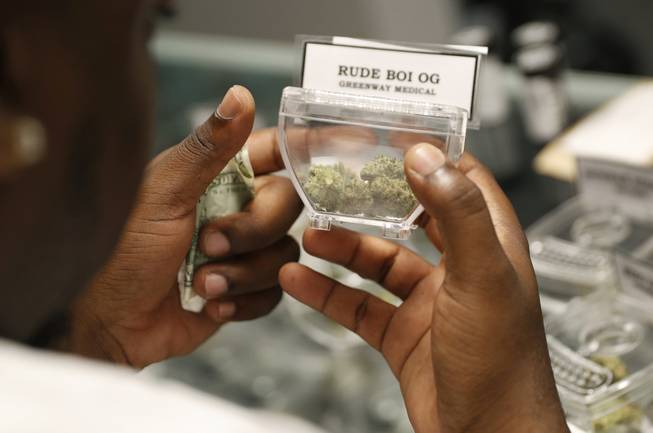
John Locher / AP
In this April 20, 2018, file photo, a customer shops for marijuana at the Exhale Nevada dispensary in Las Vegas.
Wednesday, June 19, 2019 | 9:45 p.m.
The head of Nevada’s marijuana enforcement division said Wednesday that mistakes could have happened during the state’s cannabis retail licensing process last year.
On the stand for nearly seven hours, Jorge Pupo answered dozens of questions from attorney Ross Miller about the fairness of the Department of Taxation’s grading system for the state’s second round of retail cannabis licensing.
“Licensees weren’t promised perfection, I’ll tell you that,” Pupo said. “There’s a human element at play.”
Despite admitting that certain mistakes — including typos — could have been made by evaluators during the scoring process, Pupo stood by the department’s work.
“I think everybody had the same opportunity to request clarification,” Pupo said. “I think everyone had access to the department and I think everyone had the opportunity to attend one of 70-plus public meetings and workshops regarding this issue. The application process was a fair process.”
Miller, a partner at Gentile, Cristalli, Miller, Armeni, Savarese, is representing a host of applicants that failed to receive licenses when the Department of Taxation granted more than 60 to 17 different entities. More than 461 applications were submitted.
The collection of non-winning applicants filed an injunction earlier this spring in hopes of putting a temporary halt to the licensing process.
Miller peppered Pupo with questions about the framework for the state’s scoring system, its decision to use temporary workers from Manpower to do its scoring, and its requirement for applicants to include an address for possible new dispensaries.
The discussion also centered on how the department defined a company’s ownership structure and whether it properly informed possible applicants about small changes that were made to application materials.
Wednesday marked the ninth day the parties have met before Clark County District Court Judge Elizabeth Gonzalez.
Arguing that even the small typos or miscalculations could have made a difference when some applicants lost out on a license by only a small number of points — a 250-point scoring scale was used — Miller questioned whether Pupo, or anyone else with the department, went over the Manpower workers’ scores.
Miller said it seemed odd that some evaluation sheets showed identical scores, though a group of six different Manpower temp workers had done the scoring.
“I wasn’t going to question the evaluators,” Pupo said. “I don’t think it would have been fair to any of the applicants for me to substitute my judgement for that of the evaluators. I don’t know what their perspective, what they were looking at, was. The evaluators were supposed to be independent.”
Miller also questioned why the department didn’t hire more temporary workers to go over the applications, which it was legally mandated to do within 90 days of the application window being closed. He said the state could have hired as many as 15 if it had wanted.
Pupo said he believed the department initially had trouble finding qualified temp workers for what it initially intended to pay.
He said pay for the workers — six were considered evaluators while two others helped with basic clerical duties — was then increased.
About three-dozen cannabis companies are behind the injunction that triggered the hearing.
While Thursday is the last scheduled day for hearings, Gonzalez said additional dates will likely be added.
The sides are battling over a lot of money as, from July through March, recreational and medical marijuana sales in Nevada totaled $464 million. For March alone, $59.7 million in marijuana sales were recorded, according to the state.
Sun publisher Brian Greenspun was part owner of Essence, one of the defendants in this case.
